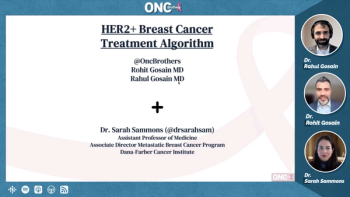
Improved Survival with Adjuvant Chemoendocrine Therapy in HR+/ERBB2+ Tumors
As prospective clinical trials continue to accrue data, the researchers indicated that this data may help clinicians in decision-making regarding adjuvant systemic therapy for patients with small HR-positive, ERBB2-positive breast cancers.
In a research letter published in JAMA Network Open, researchers suggested that there is a correlation between improved survival and adjuvant chemoendocrine therapy, specifically for hormone receptor (HR)-positive, ERBB2 (formerly HER2/neu)-positive tumors 8 mm to 10 mm.
According to the researchers, recurrence rates for patients with HR-positive, ERBB2-positive tumors range from less than 5% up to 25% at 5 years, with or without adjuvant treatments. With randomized trial data on the role of chemotherapy for small tumors currently lacking in this disease space, the cutoff size at which chemotherapy should be omitted remains uncertain.
While relevant prospective clinical trials continue to accrue data, the researchers indicated that this data could help clinicians in decision-making regarding adjuvant systemic therapy for patients with small HR-positive, ERBB2-positive breast cancers.
“It is evident that tumors 10 mm and smaller represent a heterogeneous group whose treatment should be tailored to improve the risk-to-benefit ratio of systemic therapy,” the authors wrote. “We acknowledge the inherent challenges of diagnostic concordance in the context of millimeter-based decisions, which underscores the importance of expert pathology review.”
Using the US National Cancer Database, researchers queried for female patients with HR-positive, ERBB2-positive pT1a-bN0 breast cancer diagnosed between 2010 and 2015 who received hormone therapy with or without chemotherapy. The Kaplan-Meier method and Cox multivariable analysis were then performed to evaluate overall survival, and propensity score matching was based on the nearest neighbor method in a 1:1 ratio without a replacement.
Overall, 10,065 patients were identified for the study, including 5,346 patients who received chemotherapy and 4,719 patients who did not. On multivariable analysis, multiagent chemotherapy was correlated with an improved overall survival (hazard ratio [HR], 0.69; 95% CI, 0.52-0.90; P = 0.006), and tumor size as a continuous variable was associated with worse mortality (for every 1-mm increase, HR, 1.07; 95% CI, 1.03-1.12; P = 0.002). Moreover, there was a statistically significant interaction found between multiagent chemotherapy and tumor size (P for interaction = 0.02).
Cox multivariable analysis was repeated with each tumor size cutoff, ranging from 2 mm to 9 mm, and an 8-mm cutoff was suggested to be statistically significant (P for interaction = 0.01), with a large effect size and narrow 95% CI on subgroup analysis. Further, multiagent chemotherapy was not associated with improved overall survival for tumors smaller than 8 mm (HR, 1.00; 95% CI, 0.70-1.43; P = 0.99), compared with tumors 8 mm to 10 mm, which therefore favors the use of chemotherapy (HR, 0.53; 95% CI, 0.36-0.78; P = 0.001). Additionally, comparable findings were seen in 1,641 and 648 matched pairs, respectively (tumors <8 mm, HR, 0.88; 95% CI, 0.58-1.34; P = 0.55; tumors 8-10 mm, HR, 0.48; 95% CI, 0.27-0.85; P = 0.01).
“Our study is limited by the lack of specific systemic therapy regimens,” the authors wrote. “Subgroup analysis using this cohort would be difficult because of the small sample sizes, as neither systemic therapy alone is a definitive recommendation by [the] National Comprehensive Cancer Network in this setting.”
Because the National Cancer Database is a deidentified data set, ethical approval was waived by the Roswell Park Comprehensive Cancer Center institutional review board. Moreover, the study followed the Strengthening the Reporting of Observational Studies in Epidemiology (STROBE) reporting guideline.
Reference:
Ma SJ, Oladeru OT, Singh AK. Association of Survival With Chemoendocrine Therapy in Women With Small, Hormone Receptor-Positive, ERBB2-Positive, Node-Negative Breast Cancer. JAMA Network Open. doi:10.1001/jamanetworkopen.2020.2507.
Newsletter
Stay up to date on recent advances in the multidisciplinary approach to cancer.


































